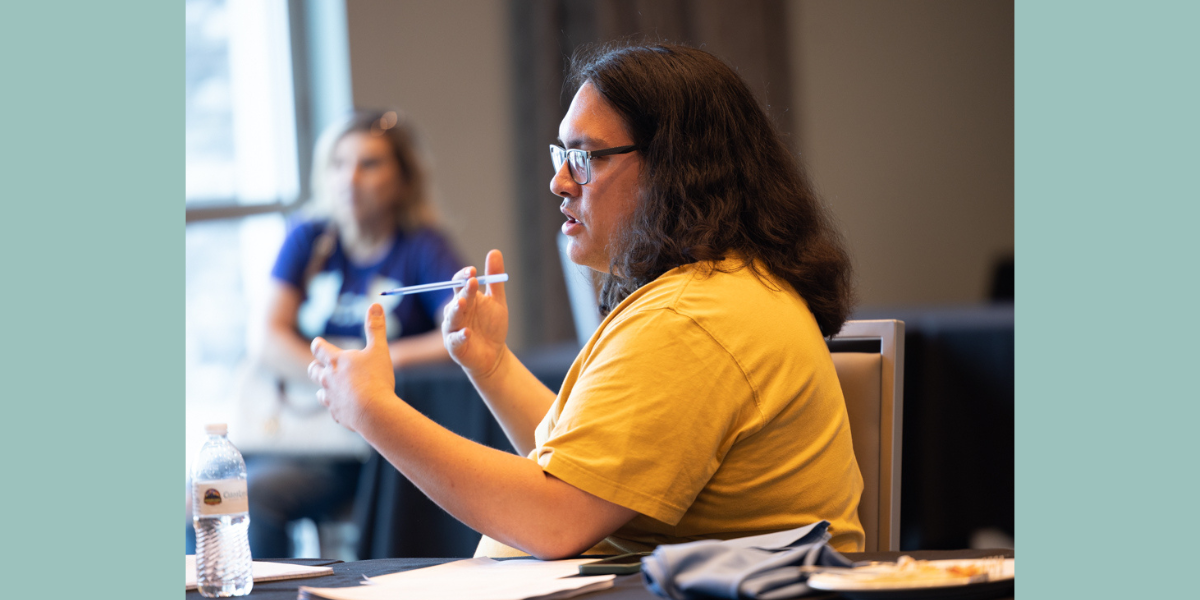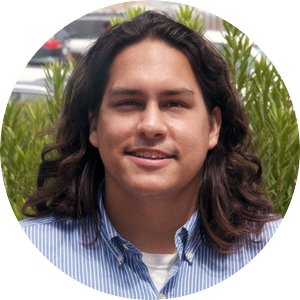For the greater good
MNPRO student member Roger Faust wins two UMN awards for conservation research and outreach to tribal communities

MNPRO student member Roger Faust wins two UMN awards for conservation research and outreach to tribal communities
Roger Faust helps facilitate a focus group with the Leech Lake Band of Ojibwe. Photo by Tonya Seiler/ MNPRO.
Managing chronic wasting disease (CWD) and its fatal impact on the populations of animals such as elk and deer is the focus of Roger Faust’s research, but public service is a core tenet of that work. In particular, he works closely with several Tribal Nation partners to address the disease on reservation and ceded territory lands.
Faust is a PhD candidate advised by University of Minnesota (UMN) College of Veterinary Medicine Professor Dr. Tiffany Wolf and is a student member of the Minnesota Prion Center for Research and Outreach. He’s also a member of the Winnebago Tribe of Nebraska and has seen firsthand how the voices of tribal communities are often excluded from state and federal natural resource management.

“These experiences fuel my determination to address the existing gaps in understanding and advocate for conservation practices that deeply respect the cultural and contextual nuances within each tribal community,” Faust says. “I use my position as a Native American academic to amplify tribal voices and ensure their inclusion in environmental decision-making.”
For his work in conservation and community-based research, Faust recently was awarded a UMN Institute on the Environment Student Impact award for sustainability and a UMN Outstanding Community Service Award. The former honors students who are leading the way toward a future in which people and the environment prosper together. The latter recognizes University community members and partners who are devoting their time, talents, and expertise to serve the public good and making significant, demonstrable, and direct contributions to society's well-being.
Community engagement regarding CWD is a key part of the work that has earned Faust this recognition.
An always fatal prion disease in deer and other cervids, CWD represents a fundamental threat to species that provide a significant food source and are culturally important to the tribes in the Upper Midwest.
Over three years, Faust led coordination with numerous tribal partners, conducting extensive CWD education and many community-listening sessions at powwows, veterinary clinics, and community meetings and workshops, engaging more than 200 community members and 140 hunters.
These efforts ensure that CWD outreach and developing management plans are tailored to meet unique community needs, values, and contexts, and foster trust between the University of Minnesota and Tribal Nations.
“By prioritizing the values, knowledge, and service of Tribal nation partners, Roger has established lasting partnerships that empower communities and guide future conservation and management efforts,” Wolf and David Fulton, a professor in the UMN College of Food, Agricultural and Natural Sciences and Faust’s other PhD advisor, wrote in a nomination letter. “We believe his efforts exemplify outstanding community service and engagement.”
In addition to his outreach and collaboration on CWD management, Faust also partners with members of the College of Veterinary Medicine (CVM) community to guide and support collaborations and programs involving Tribal nations.
Over the past two years, Faust has worked with the Student Initiative for Reservation Veterinary Services (SIRVS), a student-led group that offers no-cost veterinary services to tribal partners while building and strengthening collaboration with these communities through reciprocal learning, veterinary care, and service.
Faust has facilitated respectful community interactions by guiding SIRVS veterinarians and students to ensure culturally sensitive engagement, assisting community members in identifying pet care needs, and directing them to appropriate clinic services, fostering comfort and confidence in their pets' well-being.
“In these clinics, I provide a welcoming and comforting environment for tribal members and help veterinary students engage with community members,” Faust explains. “Sometimes this may entail crating and carrying an elder’s cat to the clinic or providing children with slinkies and coloring books that discuss CWD at an age-appropriate level.”
Faust also recently joined a CVM team in the development of a training grant that will support tribal students in their application and progress through the Doctorate of Veterinary Medicine program. For Faust, these opportunities to engage with Tribal Nations and remove barriers to professional programs allow tribal youth and students to see themselves in a career like his.
“Rarely do tribal youth interact with tribal researchers, or even academics from outside their community,” he says. “As one of the only tribal doctoral students in the country involved in conservation-oriented research, I feel a responsibility to inspire tribal youth to pursue higher education and seek environmental careers.”